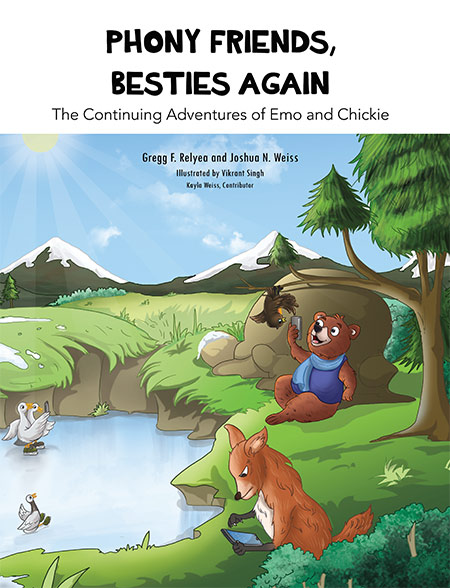14 January 2020
Legal Mediator Combats “Cancel Culture” With Children’s Books
By Lyle Moran

Internationally known mediator Gregg Relyea had just finished leading a training session in Ahmedabad, India, when a fellow dispute resolution practitioner asked him a simple question that inspired a years-long journey.
The questioner was Niranjan Bhatt, a pioneer of mediation in India. He was so impressed with Relyea’s presentation at the United States Department of Justice-sponsored event that he asked Relyea to recommend books that would help Bhatt’s children manage their disputes.
 Relyea had never worked with children but the question prompted him to look at what options were available. He quickly discovered that the children’s books on dispute resolution had a fatal flaw. Although they discussed the value of peaceful conflict resolution, the books didn’t offer young readers practical tips on what they should do to resolve the dispute.
Relyea had never worked with children but the question prompted him to look at what options were available. He quickly discovered that the children’s books on dispute resolution had a fatal flaw. Although they discussed the value of peaceful conflict resolution, the books didn’t offer young readers practical tips on what they should do to resolve the dispute.
The UC San Diego Extension instructor decided to offer solutions.
“I wanted to contribute to the education of the next generation at a time in their lives when their ideas about how to work out conflict hadn’t become crystallized and hardened in their minds,” Relyea said. Too much of today’s discourse among adults is about making demands and not making compromises.
A decade later, Relyea is the co-author of three mediation books for children that are being translated into multiple languages. The works also have drawn the recognition of His Holiness the Dalai Lama – the ultimate endorsement for a peaceful resolution expert.
A Collaborative Approach
Relyea found a willing collaborator for the work in Joshua N. Weiss, a connection made thanks to his formative mediation training at Harvard Law School.
Weiss is the co-founder of the Global Negotiation Initiative at Harvard University and director of Bay Path University’s Leadership & Negotiation master’s degree program. He said writing children’s books about conflict resolution was appealing both as a teacher in the industry and parent of three daughters.
“As your kids are developing and growing, you think to yourself, ‘How am I going to teach my kids this?” Weiss said.
He and Relyea, who both remember well their favorite books from childhood, agreed that the use of storytelling would help ensure the lessons they hoped to convey would stick with young readers throughout their lives.
“Storytelling provides a medium where a child's imagination is engaged,” said Relyea, 66. “They enter a new world, and they can absorb principles and teachings on a personal level.”
However, neither mediation expert had experience in writing for children, so they consulted experts in the field.
Weiss, 50, also tested out their first planned book on his three daughters and read it aloud in their school classrooms, among others.
“It served as a real-world opportunity to get feedback from our focus audience if you will,” he said.
The Publication Stage
Relyea and Weiss’ first children’s book — “Trouble at the Watering Hole: The Adventures of Emo and Chickie” — was published in 2017.
The book features a bear cub named Emo and his best friend, a bird named Chickie. The two friends encounter three other forest animals fighting at the watering hole about who could properly lay claim to the body of water.
Emo and Chickie encourage a moose, deer and wolf to take a time-out and calm down before continuing their discussion.
“You could take turns talking, asking questions of each other,” Chickie said. “That way, each of you can explain what matters most to you.”
The feuding animals follow the advice and reach a skillful resolution that benefits everyone.
“Trouble at the Watering Hole,” beautifully illustrated by Vikrant Singh, has drawn high praise from many big names who espouse peaceful dispute resolution, including the Dalai Lama.
“I congratulate the authors for their keen appreciation of the importance of finding ways to educate children so they grow up learning not to lash out at the first sign of conflict, but to approach problems more reasonably,” the Dalai Lama wrote. “Genuine peace and reconciliation … comes about through taking an understanding, respectful and non-violent approach to the challenges we face.”
The book has been translated into Hindi and Braille so far, with requests for it to be translated into Spanish, Italian, French, and Cantonese as well.
Spurred by the barrage of positive feedback, Relyea and Weiss wrote their second book, “Bullied No More! The Continuing Adventures of Emo and Chickie.” It was published a year after the first in late 2018.
This time, Emo and Chickie work to help Bart the beaver confront a domineering wolf. Bart also shares the details of the conflict with his parents and school officials, who work to provide helpful advice.
The authors said they hope the book not only helps young people learn how to respond to bullying, but also assists parents and teachers in talking about bullying with children.
 Social Media Disputes
Social Media Disputes
For their third book, Relyea and Weiss decided to address the hot-button topic of social media conflicts.
“Phony Friends, Besties Again: The Continuing Adventures of Emo and Chickie,” was published this summer.
In “Phony Friends,” Chickie posts an embarrassing video of Emo on “Forestgram,” that understandably sparks a dispute that requires some skill and compassion to resolve.
Though Relyea does not maintain any social media accounts, the social media use of his law students helped inspired the book.
Relyea had asked them to summarize a social media conflict they were involved in as a class assignment. He said he was stunned to find out that nearly 100 percent of his students had taken part in some sort of online dispute. The vast majority said their conflicts went unresolved, often resulting in the end of valuable friendships.
Research indicating that children have access to smartphones, and therefore social media applications, at younger and younger ages also greatly concerned Relyea.
“Kids who are being born these days are surrounded from day one by digital media,” Relyea said. “If all they know how to do is push away and avoid people they have conflict with, their whole life is going to be a process of evading and avoiding people that they had a bad experience with.
“Obviously, that is not a good result. I wanted to contribute, or at least share, some of the skills that can be used for re-establishing a relationship when desired.”
Weiss, who is active on social media, said his children gave helpful suggestions during the development of the storyline for the book.
His eldest daughter, Kayla, also provided research assistance as part of her senior project for high school. She is a named contributor to “Phony Friends.”
“It was a good opportunity to tap into some of her practical knowledge about the kinds of conflicts that happen in that realm,” Weiss said.
Next Steps
Relyea and Weiss plan to keep working together. They want to develop other forms of media for tweens, teens, 20-somethings, and others who confront conflicts, including social media disputes, according to Relyea. However, the next book Relyea hopes to get published is an adult textbook titled “Negotiation, Mediation, and Dispute Resolution — Core Skills and Practices (2019).”
Relyea, who has worked as a professional mediator and arbitrator since 1992, wrote his guidebook from experience. He says he has mediated roughly 3,000 litigated cases.
The textbook provides practical advice for both lawyers and nonlawyers about how to implement the core skills needed for effective alternative dispute resolution.
“The motivation for writing the practice guide is to help people avoid the pain of fumbling through life without understanding that conflict is normal and constructive conflict resolution skills can be learned at any age,” Relyea said.
He already uses his nearly 400-page guidebook for training and in the dispute resolution classes he teaches at UC San Diego Extension, University of San Diego School of Law, and California Western School of Law.
“I’m really enthusiastic and excited about the prospect of making it available to other schools, other instructors and professors,” he said.
Relyea’s textbook and three children’s books were shown at the Frankfurt Book Fair in Germany last year as well as the Union-Tribune’s Festival of Books.
Did you find this article helpful? Let us know in the comments!